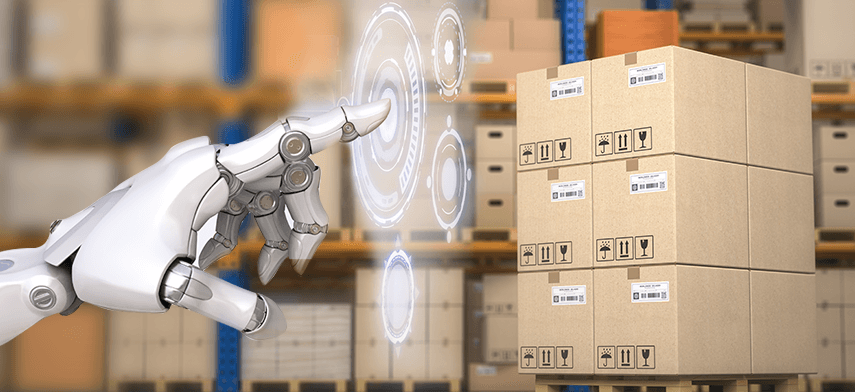When it comes to logistics, where the first focus is transportation, supply, and delivery of products, AI can serve many diverse purposes. Some commercial enterprises like Ocado, Waymo, Rolls Royce, Integrated Roadways, UiPath, Leverton, and many more have worked passionately for better incorporation of artificial intelligence in logistics.
They have understood the importance of machine learning and the benefits of optimizing production and delivery through its use. Artificial intelligence has positively affected the logistics industry, and advancements during this may cause even more high service quality.
The Global AI Market Size and Logistics
There has been a lot of expansion in the scope of the global artificial intelligence market. Various AI market statistics shall surprise you and make you realize how important it’s to incorporate artificial intelligence into every industry, including logistics.
- By 2027 the artificial intelligence industry is expected to be $266.92 billion worth of market size.
- According to Fortune business insights, 2020, significant growth of about 80% is expected in the retail Industry between 2020 to 2027.
- According to statistics 2019 reports global artificial intelligence-driven hardware market is expected to grow to $234.6 billion in 2025.
- Artificial intelligence is supposed to bring about a great deal of business adoption growth, about 37%.
- In the United States, the market share of artificial intelligence in the logistics industry has increased from 88.5% during 2018 to reach US$ 334.4 million. It is expected to record a rise of 29.4% that is US$ 536.5 million to US$ 3254.5 million by 2025.
There are various growth opportunities and increased productivity in artificial intelligence when applied to Logistics. Artificial Intelligence and machine learning increase the accuracy in computing the algorithms and reduces an effort that was otherwise required. Due to the increasing need for the management of large amounts of data, machine learning has become important for better analysis of software development and the studying of algorithms. The use of chatbots has also gained popularity because it decreases the load on human resources and is quite user-friendly.
The risk of artificial intelligence is however putting a situation of concern in the minds of a lot of people. The most concerning risks of artificial intelligence in the logistics industry is that it will replace human jobs and lead to unemployment. 70% of managerial staff and professional people are negative about the use of artificial intelligence because they fear the loss of jobs, states the Logistics Trend Index Of The Munich Trade Fair Centre.
Reasons to Have an AI-powered Logistics System
When we talk about the reasons to go for AI in logistics, we can never fall short of valid arguments on how this is the best thing to adopt. Let us look at some of the reasons for having an artificial intelligence-powered logistics system. This section of the article has almost all the reasons to convince you to adopt the same.
Supply Chain Optimization
One of the significant advantages of artificial intelligence is promoting supply chain optimization. But it’s necessary to optimize every industry component within the supply chain to reap the benefits. Starting from automated warehousing to automated vehicles, everything in between has to be optimized to the maximum capability of performance.
This leads to minimum wastage and full utilization of resources. It also decreases the expenditure due to wastage and increases customer satisfaction because the chances of a particular product’s unavailability are reduced.
Demand Prediction
Artificial intelligence in logistics minimizes most of the efforts that may be needed for accuracy in the prediction of demands in the market. The use of real-time data has made demand forecasting even more accurate and easy. The reduction of errors from traditional forecasting methods such as ARIMA, AutoRegressive Integrated Moving Average, and Exponential Smoothing Methods are worth mentioning.
AI has enabled manufacturers to reduce their operational costs by improving their human resources planning. You can optimize the number of vehicles dispatched to local warehouses and help regional warehouses or retailers to reduce their holding costs. This planned prediction of demands can hold the item to prevent the money from being invested elsewhere.
Planning and Resource Management
Managing the resource and planning efficiently is a significant component of handling a growing industry. It’s necessary because efficient planning plays an instrumental role in cutting costs and increasing customer satisfaction and overall upliftment in the system’s governing. Artificial Intelligence and machine learning can be significant contributors to analyzing the scenarios and numbers crucial for planning.
It is necessary because it contributes to effective resource management, which later helps the organization minimize expenditure and be financially sufficient. The planning of supply according to the demands in the market in real-time is necessary. It can dynamically optimize the flow of goods in the supply chain.
Real-Time Route Optimization
Artificial intelligence in logistics enables the real-time optimization of routes and cause the minimization of wastage and increases the efficiency of delivery. Industries have started using driverless delivery systems that use real-time route optimization for quick delivery without human labor.
Freight management solutions are estimated to be a lot easier through artificial intelligence and graph analytics due to efficient planning for logistics trucks. It reduces the shipping cost and also speeds up the shipping process.

Applications of AI in Logistics
There are various applications of AI, including warehouse automation, sales and marketing, manual office tasks, and Analytics. Let’s have a look.
1 Planning
There are various attributes to planning for the logistics industry. An efficient and practical approach towards planning is an instrumental part of efficient coordination and appropriate use of resources, whether financial or human. The use of real-time data for applications of artificial intelligence enables the optimization of prediction and forecasting that are far more accurate. A significantly less error is seen when compared to the traditional forecasting methods. It allows the manufacturers to efficiently and cost-effectively handle the human resources and other resources in the most economical way. It reduces the holding cost that may otherwise have led to expensive production.
2 Automated Warehousing
Apart from planning, an automated warehousing system is another essential aspect that makes use of artificial intelligence. Companies are leveraging warehouse robots to enhance the supply chain management of a business. This market is evaluated at 2.28 billion US dollars as per the data of 2016 and is expected to grow at the rate of 11.8 % between 2017 to 2022. A well-known example of applying warehouse robots is Amazon Robotics, which works with 200,000 robots in their houses across 175 fulfillment centers. These robots are used in assisting with jobs like peeking, sorting, packaging, and transporting goods.
3 Autonomous Things
The various autonomous vehicle systems are now driven by dynamic AI technologies. These include self-driving cars, robots, and drones that assist with labor-based jobs in both the factory and Logistics. Artificial intelligence becomes suitable for these jobs because it does not require any analytical skills. Self-driving cars can exponentially decrease the dependence on human drivers, and technologies like platooning can support the drivers’ health and safety by reducing fuel usage and carbon emission from vehicles.
4 Analytics
AI detects the damaged goods through computer vision technology that determines the type and depth of damage to enable the manufacturer to reduce any further damage and take action regarding the same. This is done by analyzing the real-time data that is collected from sensors installed in the machines. The analytics tools that enhance predictive analysis are enabled through machine learning, and patterns from sensor data are identified by technicians so that manufacturers can take appropriate measures to improve the situation before any failure in machinery.
5 Back-office Automation
Artificial Intelligence can increase the automation of manual office tasks requiring no expertise, such as processing emails, billings, generating reports, scheduling and tracking transportation, and employee management. Sales and marketing can also be enhanced through artificial intelligence by bringing up more precise market analytics, email marketing, and lead scoring.
6 Sales and Marketing Optimization
Companies like Mercedes Benz, Google, and Tesla are investing in the concept of automated vehicles. According to BCG estimations, by 2030, shared autonomous electric vehicles (SAEVs) shall shift about 25% of miles covered by private vehicles. Delivery drones are also gaining attention in various logistics Industries as a safe, sustainable, and reliable option for delivering multiple products, especially pharmaceutical products for those with short shelf life. It plays a vital role in freight management and reduces wastage costs and other delivery charges.
Final Words
After including all the advantages, artificial intelligence in logistics is important to incorporate this particular piece of technology into the industry to gain a significant edge over the competitors and bring about a positive and affordable revolution in the business world. Artificial intelligence not only speeds up the process but also brings about accuracy and cost-effectiveness in the industry. It has various applications that prove to be useful and cost-effective. It allows the investment of human resources into tasks aside from people who don't require skills.





 April 14, 2021
April 14, 2021


